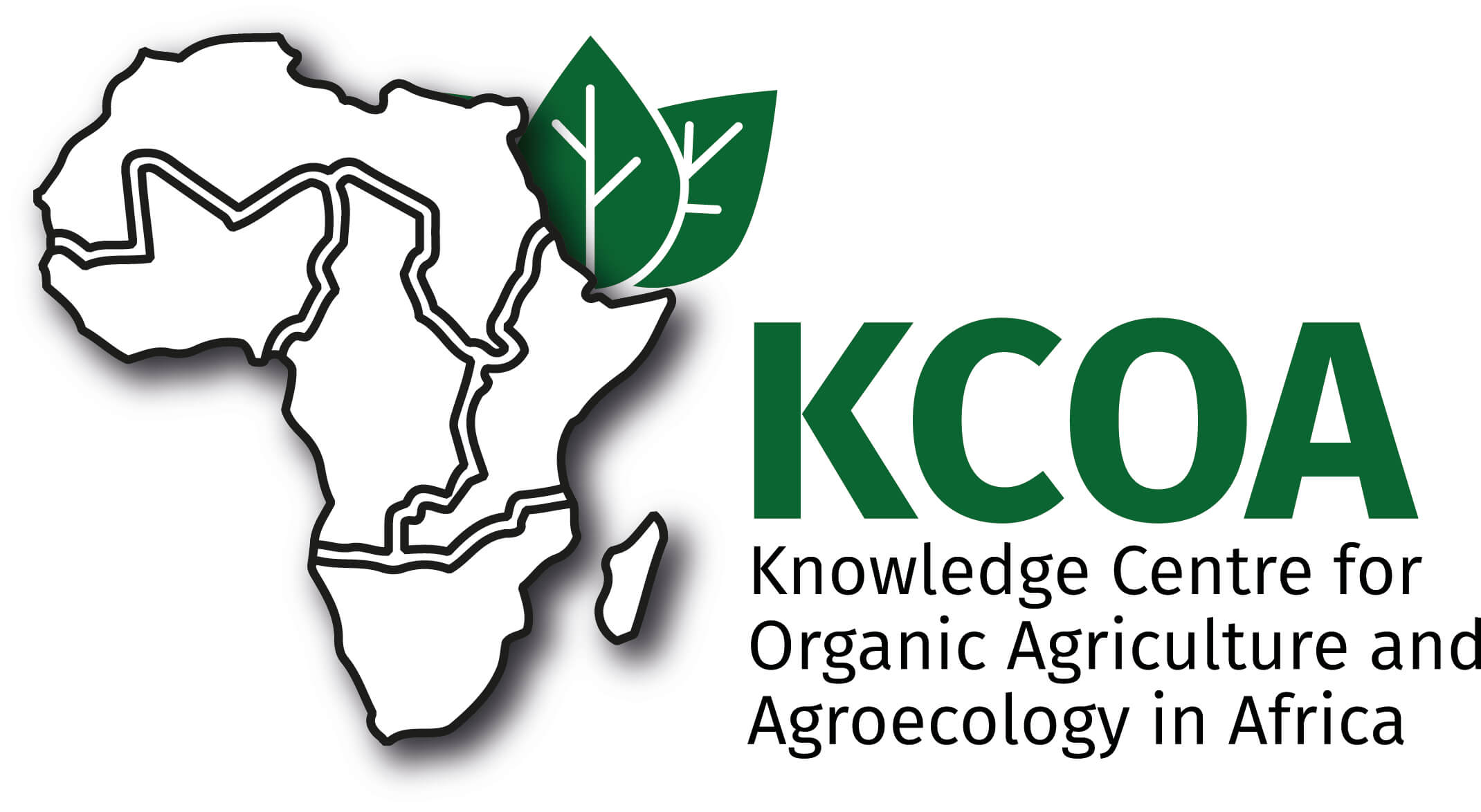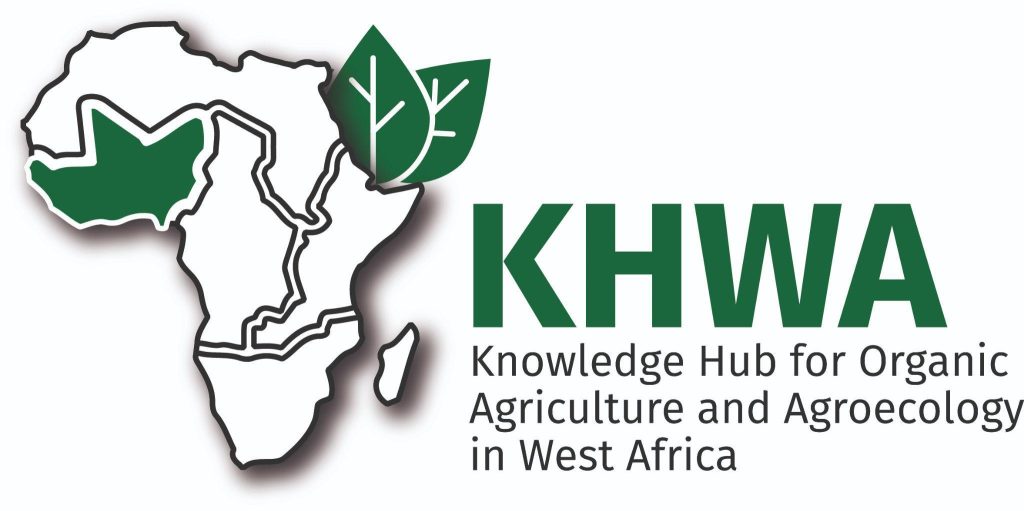

Knowledge Center for Organic Agriculture and Agroecology in Africa (KCOA)
About KCOA
KCOA is a collaborative country-led partnership that aims to scale up adoption of organic and agroecological farming practices through a network of five Knowledge Hubs in Africa. Within KCOA, the implementing organizations have three main objectives: to improve access to knowledge on organic agriculture and agroecology; to strengthen the technical and professional capacity of multipliers; and to foster networking and strengthen relationships in the sector across the continent.
Context
More than half of all people living in Africa base their livelihood on agriculture; yet, many farmers are impoverished and one-fifth of the population suffers from malnourishment. At the same time, ecosystems and resources must be used carefully.
Organic agriculture promotes food systems that increase food security and improve living conditions, while also respecting the Earth’s ecological limits. Currently, only 0.2 per cent of agricultural land in Africa is dedicated to organic farming. In the past, this has been due to limited knowledge of how organic products are produced, processed and marketed.
The Knowledge Centre for Organic Agriculture (KCOA) is working to fill these knowledge gaps by establishing five knowledge hubs.
Objective
Throughout all five African regions, these knowledge hubs intensively promote organic agriculture and agroecology.
Approach
The project is coordinated from Germany. Its measures are being implemented in the regions in cooperation with the following non-governmental organizations:
- Knowledge Hub Eastern Africa (KHEA): Biovision Africa Trust
- Knowledge Hub Southern Africa (KHSA): Sustainability Institute
- Knowledge Hub West Africa (KHWA): Enda Pronat
- Knowledge Hub North Africa (KHNA): SEKEM
- Knowledge Hub Central Africa (KHCA): CIPRE, CPF, GADD, Inades Formation, SAILD
These organizations manage the five knowledge hubs and operate in three fields of action:
They expand access to knowledge on organic agriculture and agroecology by collecting, validating and converting it into suitable formats and languages, as well as making it available on a centralised database.
They boost the technical and professional skills of multipliers in the areas of organic agriculture and agroecology. To this end, they train master trainers and multipliers on how to disseminate the knowledge in a manner adapted to target groups.
For the purposes of networking across the continent, they strengthen the working relationships between representatives from the value chains, civil society, private sector and state organisations. Furthermore, they promote cost-effective and participatory certification alternatives.
Association of Organic Agriculture Practitioner of Nigeria (NOAN) is in charge of implementation of the KCOA project in Nigeria, under the Knowledge Hub for Organic Agriculture in West Africa (KHWA). KCOA Partners collect, validate and disseminate information along the organic agriculture value chain in order to promote organic agriculture in Africa and endeavour to provide knowledge products of the highest quality. Knowledge products (KPs) are technical and methodological products that serve education / training, extension, policy dialogue, communication and awareness raising. KPs contain relevant valuable information on organic agriculture and agroecology.
Landmark achievements of the KCOA Project in Nigeria.
Training of Multipliers on Organic Agriculture
The KCOA Project has undertaken training of individuals with interest in organic agriculture to become Multipliers and Practitioners. A total of about 408 Multipliers have been trained in Capacity building Workshops, visited Agro ecological centers and organic Farms in locations including Taraba, Delta, Abia, Anambra, Akwa Ibom, Lagos and Ogun State.
Farmers’ Field School
In four locations; Lagos, Abia, Anambra and Akwa Ibom States, the KCOA Project established Farmers’ Field Schools where 30 Multipliers per locations were trained via an organically established demonstration. These farms were established following a scientific research article on Oragnic Agriculture Titled EFFECTS OF JATROPHA CURCAS LEAF EXTRACT ON THE PERFORMANCE OF OKRA (ABELMOSCHUS ESCULENTUS L. MOENCH) INFECTED WITH CUCUMBER MOSAIC VIRUS.
Networking of Organic Stakeholders
The KCOA project in Nigeria has established a National network of OA Value chain Actors and also of Multipliers which are linked to the KCOA continental digital network of Multipliers www.kcoa-Africa.org. This network enables Multipliers have access to the KCOA Database on validated knowledge resources in Organic Agriculture, promote exchanges across the African continent and other international stakeholders like FiBl etc
Creation of Knowledge Products
After a rigorous process of knowledge collection, sorting, validation and documentation in the KCOA database. The KCOA Project in Nigeria has created 5 Knowledge Products of 4 videos and a factsheet of selected and validated scientific knowledge relevant to organic agriculture.
Organic Market
In a bid to promote market for organic agriculture products. The KCOA in Nigeria has organized Organic Weekend where organic farmers are able to exhibit and sell their products. This also encouraged network of the value chains (Consumers meeting with producers and processors Vis-a-vis)
Market Data Collection
The KCOA Project has consistently collected Market data on about 54 selected food items (Agricultural Products) from February 2022 – May 2023. Data were collected monthly from major markets in Anambra, Akwa Ibom, Lagos, and the Federal Capital Territory Abuja.
Media Advocacy of Organic Agriculture
The KCOA Project has engaged in over 10 radio programs and Television in reputable radio stations such as 92.9 Federal Radio Corporation (FRCN) Radio Nigeria, Abuja, 105.5 Jordan Lens, Lagos, Nigeria, and ARCN TV and so on. These Radio and Television stations are reputable for wide coverage of millions of audience across the Nation. Advocacy through electronic, social media and hybrid workshops has led to engagements of the KCOA with stakeholders in Taraba, Ondo, Niger, Anambra, Kano, Akwa Ibom, Abia, Delta, Oyo, Ebonyi, Ogun, Osun, Lagos, Enugu, and the Federal Capital Territory Abuja.
Database of Organic Agriculture
The KCOA Project has effectively collated dozens of validated scientific and endogenous knowledge and reposed in the KCOA digital platforms for usage by the Multipliers and organic agriculture stakeholders.








